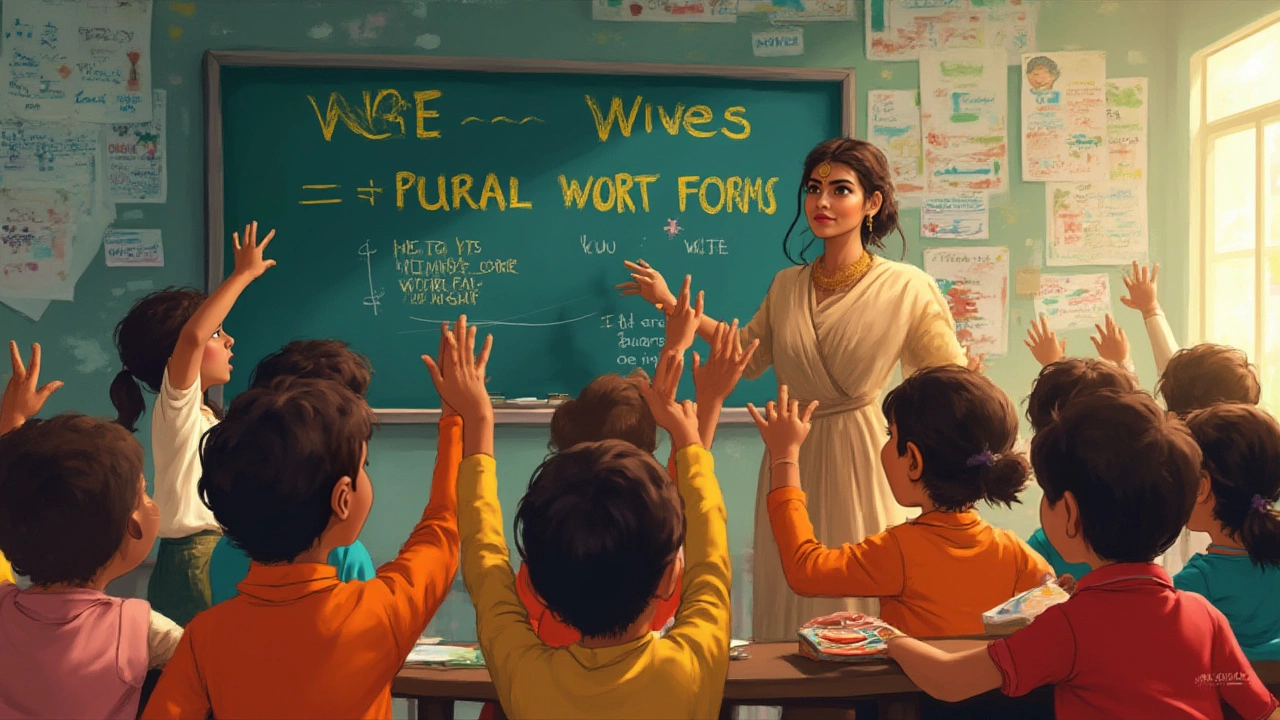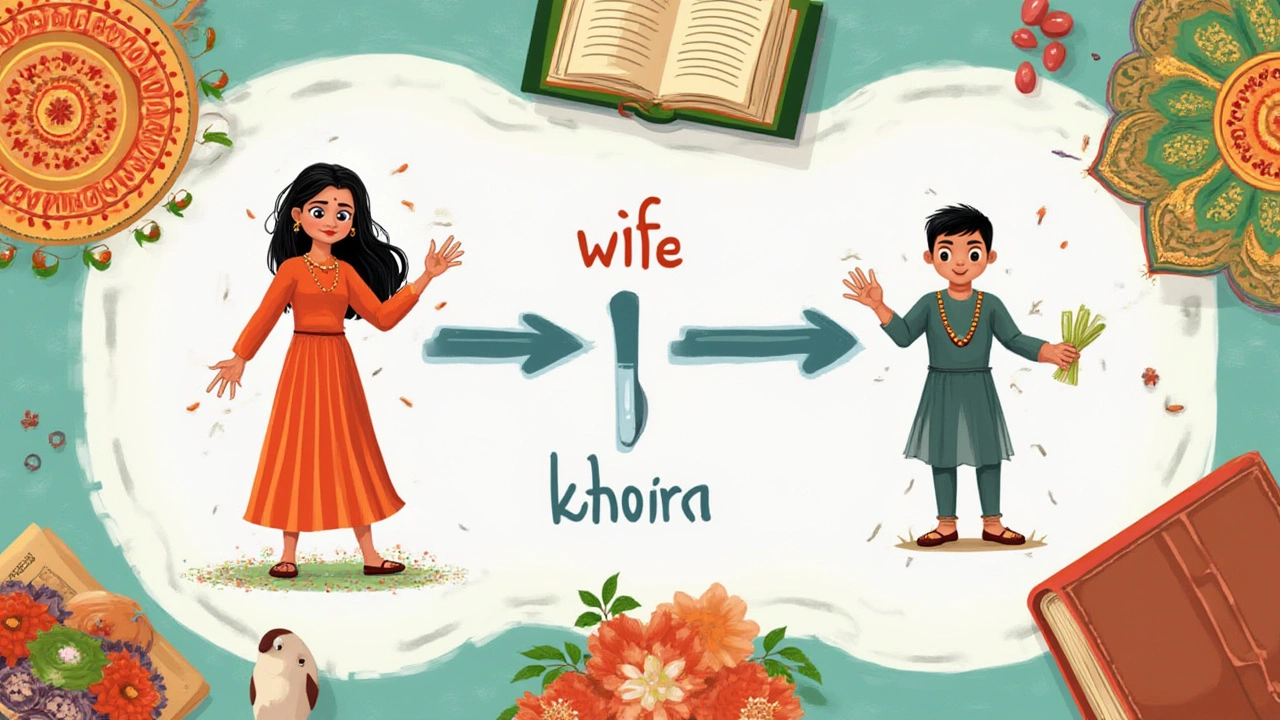Plural of Wife: Correct Spelling, Origins, and Usage in Modern English

Confession time: Few plural forms trip up adults as much as the word "wife." Fans of spelling bees and pub quizzes know that English just loves to mess with simple rules. Ever caught yourself typing "wifes" and suddenly second-guessing every decision you ever made? Sure, you remember "knife" turning into "knives," but why? Why does "wife" break from the basic rule and change so dramatically? Even native speakers have to pause every now and then to make sure they nail it right—so you’re not alone.
The Correct Plural of Wife—and Why
The correct plural of "wife" is "wives." You might wonder what’s going on with that ‘f’ turning into a ‘v’ and then taking an ‘es,’ instead of just a simple ‘s’. English plurals can be pretty weird, but there actually is a pattern at play here. The switch happens in many words that end with –f or –fe. When forming the plural, the ‘f’ changes to a ‘v’ and then you add ‘es’ (“wife” becomes “wives,” “life” becomes “lives,” “leaf” becomes “leaves”). This isn’t universal though; some words like "chief" or “roof” stubbornly stay regular ("chiefs," "roofs"). wife plural is a classic you need to know, and it’s one that’s stumped plenty of folks—even published authors.
This pattern has roots in Old English, where the pronunciation of -f- sounds would change before a vowel. For “wife,” Old English used “wīf,” but when adding the plural ending, the sound shifted and eventually evolved into what we now recognize as “wives.” Table time: here’s a quick breakdown of some common –f/–fe changing English nouns.
| Singular | Plural |
|---|---|
| wife | wives |
| knife | knives |
| life | lives |
| leaf | leaves |
| wolf | wolves |
| shelf | shelves |
| calf | calves |
But beware: words like “belief,” “roof,” and “chief” break this rule and don’t turn their ‘f’ into a ‘v.’ For those, just slap on an ‘s’ and you’re golden. The rules aren’t always logical, but once you see the pattern (or, more accurately, the patterns and exceptions), it’s easier to remember.
Words Like Wife: Plural Patterns and Common Pitfalls
The "wife/wives" swap isn’t a one-off. English has a handful of nouns with similar changes. Getting the plural right is important not just for spelling exams, but for legal papers, formal writing, and—you know—the internet, where typos live forever. Take “life,” “knife,” “self,” and “wolf.” They all get the ‘f’ to ‘v’ and add ‘es’ treatment. Then you’ve got “roof,” “chief,” and “cliff” that just take ‘s.’ Frustrating, right?
Why do some nouns change and others don’t? It’s mostly a legacy from Old English rules and regional pronunciation shifts centuries ago. Words adopted later—like "chief" from Norman French—didn’t get the makeover. That’s why "wives" isn’t the only tricky one, but it’s one of the most commonly misspelled. In fact, language studies in the UK and US regularly list “wifes” as one of the top 50 spelling errors even in formal documents and marriage-related paperwork.
Here’s a tip: if you’re ever in doubt about a plural, try thinking about a similar-sounding word that you know is right. If you’re good with “knives” or “lives,” you’ll likely get “wives” correct, too. On the flipside, if you spot "wifes" in an email from your lawyer or on a restaurant’s “wives night” event page, you’ll know they missed the memo. Another hack—auto-correct isn’t always right, so don’t trust your spell checker alone! Make a mental list of words that break the –f/–fe rule, and you’ll cut down on the most embarrassing typos.

Wife, Wives, and English Around the World
It’s not just the spelling geeks and grammar snobs who care. Marriage records, legal forms, international treaties, and even classic literature all rely on getting this one right. “Wives” has featured in everything from Shakespearean plays to modern Netflix subtitles. In Charles Dickens’s “Nicholas Nickleby,” you’ll find characters speaking of their “wives” with exactly this spelling, and no one corrects them—proof it’s nothing new.
Making the plural mistake can cause real confusion, too, especially in official paperwork. When translating English to other languages, the “wives” plural gets a unique translation in most cases—languages like Spanish use “esposas,” and in German it’s “Ehefrauen.” Many European languages use a totally different stem (not just a suffix) for their plurals, so “wife” changes more dramatically than just a letter or two. For language learners, English’s inconsistent plurals are infamous. Surveys by British Council revealed that learners routinely struggle with "wives" as well as "leaves" and "wolves," way more than with regular plurals like "dogs" or "cats."
And then there’s legal stuff. In countries like the US and UK, the word “wife” (and by extension “wives”) shows up in divorce papers, wills, inheritance rules, and anywhere else the law and marriage cross paths. A misspelling—or the wrong plural—really can void parts of a contract or render a legal document confusing or invalid. That’s not just annoying, it’s expensive. Proofreading is underrated.
Fun Facts, Cultural References, and Tips to Remember
If you ever watched “The Real Housewives” or laughed through “Desperate Housewives,” congrats—you’ve seen the plural in real life. Pop culture is actually full of reminders. And linguists? They point out this kind of plural as a sign of how English loves to evolve and complicate itself in surprising ways. “Wives” is even part of famous proverbs—“Behind every great man is a great woman,” as the old saying goes, but sometimes you hear, “Behind every great man are great wives”—usually as a joke about famous kings or celebrity scandals. Even Google search stats show “plural of wife” getting around 10,000 hits a month globally!
Want a surefire way to lock in the spelling? Memorize rhymes. “Knives and wives stay alive.” Or even make a mental note that both "wife" and "knife" end in "ife" so they behave the same when pluralized. Flashcards help, but honestly, using the word in context works best: “My uncle has three wives in Utah”—just make sure you're telling the truth, or ready for follow-up questions.
- If you're teaching kids, use silly sentences. “Seven elves deliver leaves to their wives.”
- For legal or academic documents, always double-check your spelling. Legal spellcheckers don’t always catch “wifes.”
- If you’re learning English, group all similar -f/-fe words together for practice.
- Don’t count on autocorrect. Some popular phone keyboards still miss “wives.”
So the next time you’re tempted to type “wifes,” stop and remember: English history, legal detail, and TV dramas are all rooting for “wives.” It’s one odd little word, but it’s got a history—and a logic—all its own.